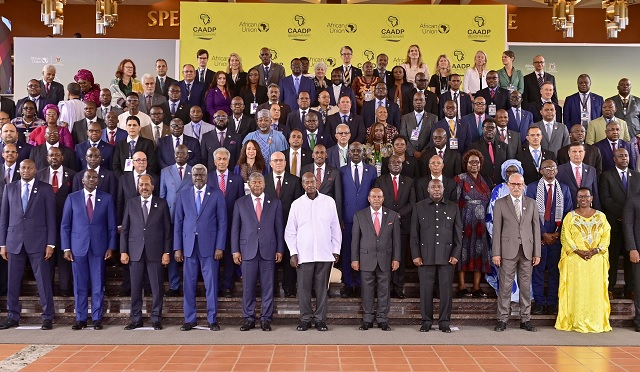AU Adopts 10-Year Strategy to Revolutionize Agri-Food Systems
The African Union (AU) has launched an ambitious 10-year strategy and action plan to transform Africa’s agri-food systems and secure food sovereignty by 2035.
Adopted during the Extraordinary Summit on the Post-Malabo Comprehensive Africa Agriculture Development Programme (CAADP) in Kampala, Uganda, the plan aims to increase agrifood output by 45%, halve post-harvest losses, and triple intra-African trade in agrifood products.
Ugandan President Yoweri Museveni, hosting the summit, stressed the need for value addition and removing non-tariff barriers (NTBs).
“This Africa of having no food and begging is not the real Africa. Adding value ensures vertical integration from farm to table. We must also eliminate NTBs that disrupt agricultural trade,” Museveni stated.
AUC Chairperson Moussa Faki Mahamat expressed concern about the slow progress since the Malabo Declaration in 2014.
“The biennial evaluations show progress, but at an unsatisfactory pace. The Kampala Declaration reflects the collective efforts to address underlying challenges,” he said, commending AUDA-NEPAD, regional economic communities, and technical partners for their preparatory work.
Ethiopian President Taye Atske Selassie called for renewed commitment, noting, “This Summit marks a defining moment for Africa. We must act collectively to achieve our vision for a food-secure, prosperous continent.”
Amb. Josefa Sacko, AU Commissioner for Agriculture, outlined the new strategy’s comprehensive approach, stating, “We now have a roadmap with realistic objectives and targets aligned with Agenda 2063. This inclusive design ensures readiness for implementation.”
Norway’s State Minister Bjørg Sandkjær, representing development partners, applauded the strategy’s alignment with Africa’s broader aspirations.
“This bold vision emphasizes agri-food systems as drivers of growth, food security, and sustainable health outcomes,” she remarked.
The Kampala Declaration, endorsed by all 55 AU member states, sets commitments to sustainable production, agro-industrialization, and trade to address the continent’s growing food demand.
The strategy, slated for implementation from 2026 to 2035, promises to shape Africa’s agri-food systems, ensuring resilience, inclusivity, and economic growth.



